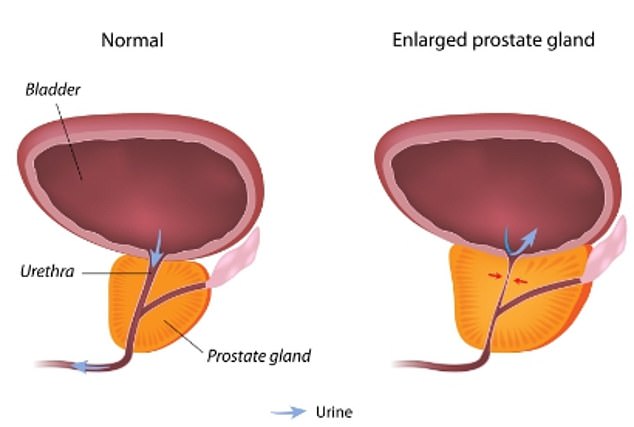Searches for ‘enlarged prostate’ soar after King Charles’ diagnosis: NHS advice page recorded one visit every 5 seconds after bombshell news – 11 times more than normal
Searches for ‘enlarged prostate’ on the NHS website have soared after the King shared his diagnosis, new figures show.
There were 16,410 visits to the health service’s prostate enlargement page on Wednesday, which equates to one every five seconds.
NHS England said this was 11 times more than the 1,414 hits recorded on Tuesday.
Experts believe the King’s desire to share his diagnosis of an enlarged prostate will lead to an increase in the number of men with symptoms of the condition seeking help.
It is understood Charles, 75, was keen to share his diagnosis to encourage other men who may be experiencing symptoms to get checked in line with health advice.
King Charles III will go to hospital next week to be treated for an enlarged prostate
One in three men over the age of 50 will have symptoms of an enlarged prostate, including needing to go to the toilet more often and urgently, and difficulty emptying the bladder.
The Daily Mail has been at the forefront of the fight against prostate health for a quarter of a century.
Since 1999, the Mail has been calling for better diagnosis and treatment of prostate cancer, encouraging men to stop ‘dying of shame’.
It has led to reporting on promising new treatments, including MRI-guided transurethral ultrasound ablation, which bombards tumors with sound waves and could also be used to treat enlarged prostate – known as benign prostatic hyperplasia.
Buckingham Palace said Charles’ condition was benign and he would undergo a “corrective procedure.”
Ian Eardley, consultant urological surgeon in Leeds and national clinical director of NHS England, said the condition becomes more common with age and will affect up to four in five men aged 75.
“It’s very common: at that age you would expect well over 70 to 80 percent of men to have an enlarged prostate,” he said.
‘About half of them will develop complaints, and broadly speaking, about half of them will suffer from those complaints to some extent.
“To some extent, it’s an inevitable part of aging for almost all men.”
Asked whether the announcement would lead to more people seeking help, Mr Eardley said: ‘The nature of these things is that if it becomes public knowledge it will lead to more men seeking help. That’s a good thing.’
He said that prostate problems have traditionally had a “perception that it’s something you don’t want to talk about” and that “it’s actually a good thing to be able to talk about it, not least because the whole stack of things we can do ‘.
‘The majority of men do not need surgery.
‘The majority of men just need to be monitored and their symptoms will often improve significantly if they take one or two pills, something a GP can do quite easily,’ he added.
Meg Burgess, a specialist nurse and Prostate Cancer UK, said: ‘As the prostate enlarges it can cause problems with emptying the bladder. As the prostate enlarges, it can press on the urethra and water pipes, causing urine leakage. symptoms.
“It’s a benign condition, so it’s a non-cancerous condition.”
Ms Burgess said not all men with the condition will undergo surgery, adding: ‘It really depends on how much distress the symptoms cause and what the treatments might be.
‘Initially it might just be some lifestyle changes, looking at what you drink, how much you drink.

This NHS diagram shows how an enlarged prostate can press on the bladder and narrow the urethra, a process that can cause a variety of urinary problems
‘If the symptoms are causing more distress, there are medications that can be very useful in treating the symptoms, so for many men tablets will be enough to relieve symptoms.
‘But if medication doesn’t help, there are a number of different surgical options that can help reduce symptoms and improve bladder emptying.’
She said the most common surgical option is a so-called transurethral resection of the prostate (TURP), a surgical procedure in which part of the prostate is cut away.
Approximately 15,000 prostate resection procedures are performed in England and Wales each year.
She said men who have urinary tract problems or are concerned about their risk of prostate cancer, which usually has no symptoms, should contact their GP.
Other wins for the Daily Mail’s prostate campaigns include the use of MRI scans for almost all men suspected of having prostate cancer.
In November last year, health leaders announced a first-of-its-kind pilot that could revolutionize detection of the deadly disease, inviting thousands of men for screening using MRI scanners for the first time.
The announcement followed the relaunch of the ‘End Unnecessary Prostate Deaths’ campaign.
